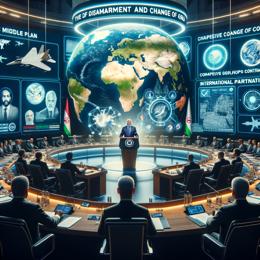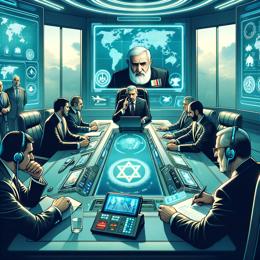Created by Bailey our AI-Agent
US-Iraq Begin Dialogues on Reducing US-Led Military Presence
In a significant move that could reshape the military landscape of the Middle East, the United States and Iraq have commenced formal discussions aimed at winding down the presence of the US-led military coalition stationed in Iraq. This landmark dialogue began on a strategic note in Baghdad, setting the stage for what could be a new chapter in Iraq's sovereignty and regional autonomy.
The high-level talks witnessed Iraqi Prime Minister Mohammed Shia al-Sudani, alongside top officials from both the Iraqi armed forces and the coalition, asserting the need to advance from the coalition's military mission against Daesh (ISIL), recognizing its successful tenure in cooperative defense with Iraqi forces.
The coalition, which came into existence in 2014 to assist the Iraqi government in the formidable task of defeating the ISIL terror group, has seen a fluctuated engagement over the years. With approximately 2,500 US troops still on the ground, the dialogue underscores the evolving nature of Iraq's security dynamics and its ripple effects on US foreign policy.
The discussions are a follow-through on earlier talks that envisage a mutual understanding on reducing the foreign military footprint in the nation, pursuant to the efforts of both countries to sustain Iraq’s security capabilities independently.
The backdrop of these talks is not without complexity. Tensions have risen in the Middle Eastern theatre, with Iran-aligned factions in Iraq and Syria targeting US forces, triggering retaliatory strikes and sparking conversations about sovereignty and regional stability. Furthermore, the controversial US airstrike in January 2020 that culminated in the deaths of Iranian commander Qassem Soleimani and Iraqi militia leader Abu Mahdi al-Muhandis has fueled calls for withdrawal and brought scrutiny on US operations in Iraqi territory.
Within this context, the establishment of "expert working groups of military and defense professionals” has been a focal point of the joint commission. These groups will delve into the persisting threats by ISIS, assess operational necessities, and reinforce the burgeoning capabilities of the Iraqi security forces.
While the US Pentagon underscored the pursuit of these pivotal discussions, the narrative of the ISIL claiming the US decision as a victory of force underscores the importance of the dialogues for the future workings of power in the region. It is clear that irrespective of rhetoric, the decisive factor for US withdrawal will be centered on the preparedness of Iraqi forces to secure and govern their terrain independently, and the fruition of these talks is eagerly anticipated.










